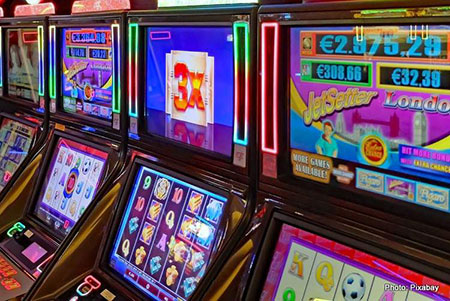SEPARATING FACT FROM FICTION
Myth busting modern slot machines
By John Grochowski
 Slot machines have had their own set of myths practically since Day One. Specifics have evolved with slot technology, but mythology persists.
Slot machines have had their own set of myths practically since Day One. Specifics have evolved with slot technology, but mythology persists.
That’s normal enough. You can’t see random numbers being generated so the mind fills in the gaps. Let’s try a little mythbusting about modern slot machines.
THE MYTH: Paybacks on pick-a-prize bonus rounds have to be fixed in advance or they couldn’t program a payback percentage.
THE FACTS: Your choices count on most manufacturers’ bonus events. The programmer sets the possibilities, and that determines the odds of the game.
The programmer doesn’t have to fix the value of the bonus event; the odds of the game will lead to an average return. That average can be included in the overall game probabilities to calculate an average payback percentage for the game.
In licensed casinos in U.S. jurisdictions, every advertised prize must be available. After you’ve made your pick, if the screen shows prizes behind other choices, it tells you those paybacks were actually available. Your choice made the difference, for better or worse.
THE MYTH: Video and online slots are just computer programs, so they’re more easily fixed to beat you than three-reel slots.
THE FACTS: All modern slots, including reel-spinning games as well as video and online slots, use computer software and have results determined by random number generators (RNGs).
The potential for “fixed” results is the same on reel slots as on those with screens. It’s certainly possible to design shenanigans into software, but in well-regulated jurisdictions such as U.S. states and Canadian provinces, rules, regulations, licensing and software checks work to keep results random.
Random number generators don’t fix results, either for you or against you. All the RNGs do is generate numbers, and those numbers are mapped onto possible outcomes.
The result you see on the screen is random, or at least as random as it’s possible for humans to program them to be. The possibilities and the odds are the same on every spin.
THE MYTH: Advertised payback percentages on slots shows they can’t be random. How can a game have a predictable return and be random at the same time?
THE FACTS: Slot machines are random and have predictable payback percentages in the same way as table games. Odds are set so average results lead to the expected return.
Imagine the situation at roulette. On an American double-zero wheel, the game is “programmed” with 38 possible results—1 through 36 plus 0 and 00.The numbers come up randomly, and when you win on a single number, you’re paid at 35-1 odds—a bit less than the true odds of 37-1. That gives the house an edge of 5.26 percent. That’s the same as saying a payback percentage of 94.74 percent.
There is nothing to keep your number from coming up multiple times in a row, and nothing says it has to come up within several dozen spins. But given enough trials, the random results and the odds of the game will lead to something very close to roulette’s expected percentages.
Slots work the same way, but with thousands of possibilities instead of 38. To make up an example, the program might specify that every time the random number one shows up, the reel shows a jackpot symbol; with two, three or four, it shows a seven, and so on.
The possibilities are programmed, but when they turn up is random, just as it’s random when a 17 turns up in roulette. The odds of the game will lead to the expected payback percentage, or something very close to it.
THE MYTH: After a progressive jackpot or a big bonus win, slot machines have to go cold for a game to hit its programmed percentage.
THE FACTS: Odds of winning are the same on every spin regardless of past outcomes.
Slots keep paying the percentage determined by the normal odds of the game. Over time, big jackpots, hot streaks and cold streaks all will fade into statistical insignificance.
Game designers know jackpots will hit according to the normal odds of the game. And the normal odds of the game will lead to an expected payback percentage without any forced cold streaks.
“Odds of winning are the same on every spin regardless of past outcomes.”
THE MYTH: On games with wheel-spinning bonuses, such as Wheel of Fortune, wheels are fixed so you get only low payouts.
THE FACTS: Bonus wheels have RNGs just like slot reels. It is possible to win any of the amounts on the wheel, including the largest jackpots. A reader once even emailed to say she had won the largest Wheel of Fortune prize twice in a row.
However, more random numbers are assigned to lower-paying spaces, so you will win small prizes more often than the top jackpots.
Pretend you’re a game designer and you’re setting up a game with a wheel divided into 22 segments, ranging from a $20 payoff to $1,000.You don’t want to be paying out $1,000 once per 22 spins, so you program a virtual wheel with 1,000 numbers. You could map it so that every time the RNG spits out number 1, the wheel stops on the $1,000 space. You could map four numbers that will make the wheel stop on the $500 space, and so on until you use 100 numbers to make it stop on a $20 space. Now, instead of paying out $1,000 once per 22 spins, your hypothetical game will pay the grand only once per 1,000 spins. And instead of paying $20 once per 22 spins, it’ll be one out of 10. The game is random, but it’s skewed toward smaller payoffs.
Just as with basic slot games, the results are random but possibilities are set to lead to an expected average outcome.


